Israel-Hamas war: What happened on day 81?
Nine soldiers wounded by gunfire at northern border • IDF finds traces of Hamas hostages in Gaza's Indonesian Hospital
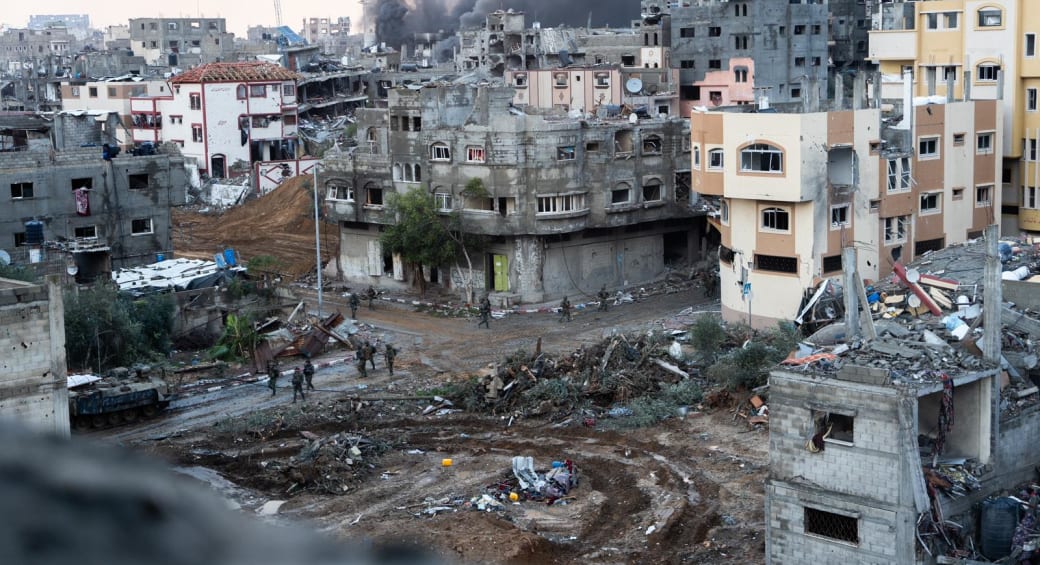

IDF Chief Halevi: Gaza war could take months, IDF targeting Hamas leaders
He said the IDF must ramp up its dominance in southern Gaza.
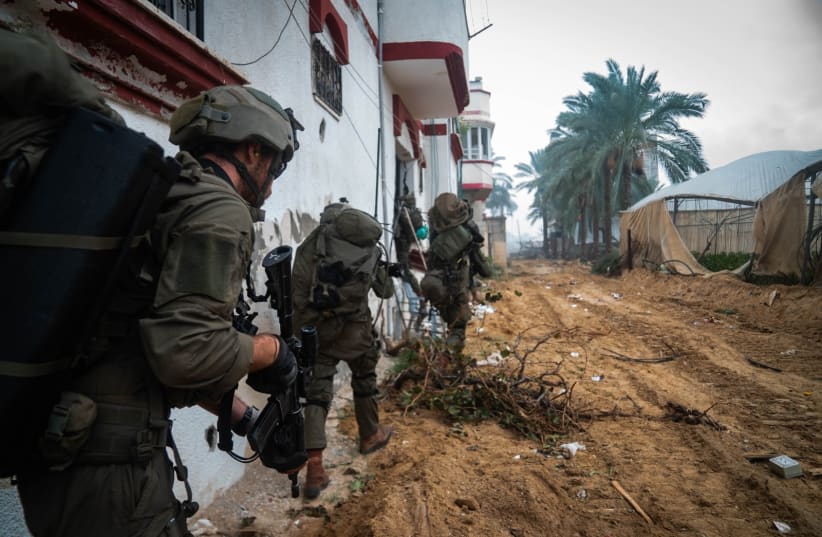
IDF Chief-of-Staff Lt.-Gen. Herzi Halevi on Tuesday said that it could even take months to arrest or kill Hamas's top leaders and "many months" to finish fighting Hamas.
Halevi implied that he recognized the broader diplomatic and political context will not allow a full all-out war for that long and said that the IDF would adjust itself to different intensity levels of fighting as needed.
Go to the full article >>Japan freezes assets, imposes sanctions on Hamas
The Japanese government has frozen assets and imposed sanctions on payments and financial transfers to senior members of the Hamas terror organization, Israeli Foreign Minister Eli Cohen said in a post on X on Tuesday.
"Israel welcomes the Japanese government's decision to freeze assets and impose sanctions on payments and financial transfers of senior members of the terrorist organization Hamas, Yahya Sinwar, Muhammed Deif, and Marwan Issa," he posted on X. "We thank Japan for its commitment to fighting terrorism and building a world free of terrorism."
WATCH: IDF soldiers in Gaza discover weapons cache in child's bedroom
The soldiers also managed to kill several Hamas terrorists in close-quarters combat.
The IDF's 931st Battalion of the Nahal Brigade discovered a cache of weapons, including dozens of Kalachnikovs, grenades, Bazukas, RPG rocket heads, and Israeli license plates inside a children’s bedroom in a civilian house, in the Tuffah area of Gaza City, the military announced on Tuesday.
The soldiers also managed to kill several Hamas terrorists in close-quarters combat.
Go to the full article >>Gallant: We are in a multi-front war, none of Israel's enemies are safe
"We were brutally and barbarically attacked to discourage us from living here."
Defense Minister Yoav Gallant stated on Tuesday that Israel was in the midst of a war on seven different fronts - one that would be a long, hard war with a heavy price.
"We are in a multi-arena war, we are being attacked from seven different sectors - Gaza, Lebanon, Syria, Israel, Iraq, Yemen and Iran," Gallant told the Foreign Affairs and Defense Committee. "We have already reacted and acted in six of these decrees, and I say here in the most explicit way - anyone who acts against us is a potential target, there is no immunity for anyone.
Go to the full article >>Egypt's Al Qahera News TV: explosions heard in skies of Red Sea city of Dahab

Explosions were heard over the Egyptian Red Sea resort city of Dahab on Tuesday, Egypt's Al Qahera News TV reported.
Go to the full article >>IDF lawyer to 'Post': We comply with int'l law because of duty to democracy
Senior IDF military lawyer details legal weight of attacks with heavy civilian casualties.
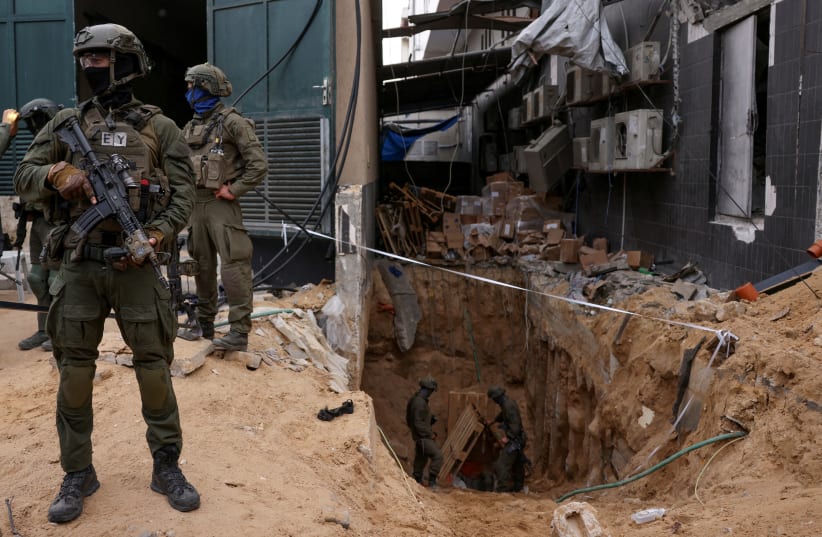
This is Part 2 of The Jerusalem Post's interview with a senior IDF military lawyer. To read Part 1, please click here.
Back in October, airstrikes in Gaza were particularly dense in Jabalya in the northern Gaza Strip. A senior IDF military lawyer has told The Jerusalem Post that some of the incidents are among those that the operational military preliminary probes have started to look into to examine the military’s adherence to the laws of war.
Allegedly, an overwhelming number of Palestinian civilians, between 69 and 125, were killed in Jabalya. The operation’s purpose was to kill a senior Hamas official; it appears that the IDF had factored in a small number of civilian casualties from the one location he was inhabiting.
However, the house that was struck led to collapsing the tunnel below it, which in turn collapsed a range of nearby structures.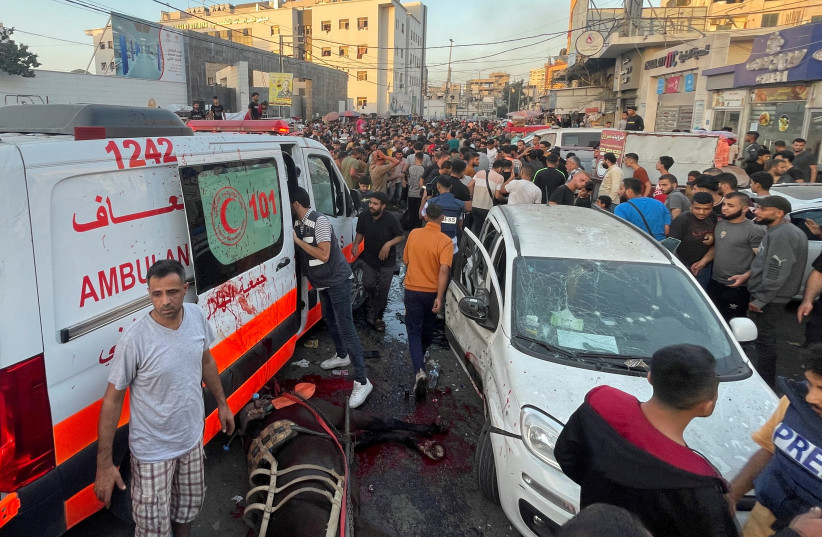
In such cases, the IDF official said he and his field team would need to examine questions of proportionality based on what it could have reasonably been expected to know before the operation, not what the result turned out to be using the information it did not yet know.
From a military advantage perspective, since the goal is to take control of Gaza from Hamas, the value of eliminating Hamas tunnels is far higher than before and is also important for ongoing force protection as the troops maneuver the ongoing invasion.
IDF learns lessons of past failures
The expected harm to civilians is notoriously hard to guess, but he admitted that the IDF learned lessons from a conflict disaster back in May 2021, in which large numbers of civilians were killed by accident due to the unexpected collapse of a tunnel under a residence, which caused the whole block of residences to collapse.
Even with that, the height, length, and width of the tunnel may be different than what intelligence estimates, he explained. The solidity or rickety-ness of the materials from which the tunnel is made may also be different than IDF estimates.
The official noted as well that if Hamas hides explosives around a tunnel to try to trap and kill troops – which causes explosions and more residences nearby to collapse – the IDF cannot be held accountable for that.
Another special category of cases in this war is hospitals. Although medical centers have special protections under the laws of war, their status can change – again due to the question of proportionality.
The scenario plays out as follows: What if the IDF only takes over a facility but does not fire at it? The official was skeptical as to whether, in such a case, there could be a basis to even begin a criminal inquiry.
In other words, the very fact that the IDF chose not to attack Shifa actively would negate any case of criminality for indirectly caused deaths from the general negative impact on the hospital’s functionality caused by having been surrounded.
At the level of disrupting its functionality, Hamas would be blamed for using it as a military command center and weapons depot, and the IDF would be justified in taking it over, especially if it did not actively fire on the facility or anyone within it.
One area where the IDF has not given much of a legal rationale for its actions was the early days of the war when it blocked Gaza’s access to water.
Blocking access to fuel could have a basis to directly weaken Hamas’s war-making efforts, but blocking access to water would potentially be a grave violation of humanitarian obligations to Gazan civilians.
The official said, “You need to remember that only 10% of Gaza’s water supply comes from Israel.” He added that in terms of the pipes for delivering water, when Hamas’s rockets damaged the pipes, Israel worked to fix them quickly, which provided significant water to Gazan civilians.
The official concluded, “We comply with international law because of our commitment to democracy.”
Go to the full article >>IDF releases names of three soldiers who fell in Gaza combat
All three died on active duty in Gaza.
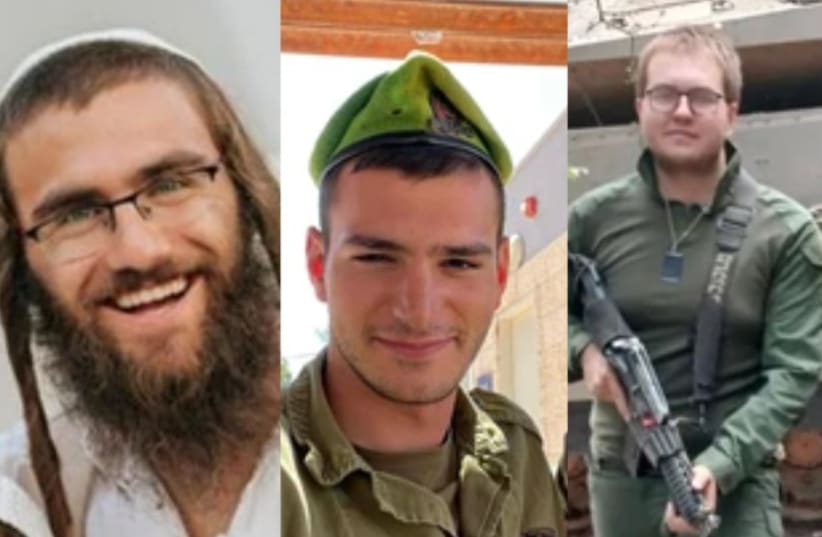
The IDF announced on Tuesday morning the death of two soldiers who fell in battle in the Gaza Strip.
Staff Sgt. (res.) Elisha Yehonatan Lober, 24, of the 179th Reserve Armored Brigade’s 8104th Battalion, from Yitzhar was named as the first soldier.
Lober is survived by his parents, his eight siblings, his child, and his wife, who is pregnant.
"We will continue to struggle and to fight so that the goals of this war will be fully achieved. Yehonatan's death will not be in vain and only an overwhelming, total, and clear victory will calm us," said Shay Elon, head of the Beit El regional council. "The best of our children give their lives for the nation and the country and we must be worthy of them and their sacrifice."
Sgt. First Class (res.) Joseph Yosef Gitarts, 25, of the 179th Reserve Armored Brigade’s 7029th Battalion, from Tel Aviv, was the second soldier announced.
Later on Tuesday, the military announced that St.-Sgt. Daniel Nachmani, from Kfar Saba, who served in the 71st 'Barak' Battalion, died of his wounds on Monday from injuries sustained during combat in Gaza last week.
Go to the full article >>Trap of Gaza: Why Rafah is the city that could lead Israel and Egypt to conflict
Despite the focus on Khan Yunis, Rafah, surprisingly, emerges as a more intricate trap, as the conflict there poses significant challenges on multiple levels.
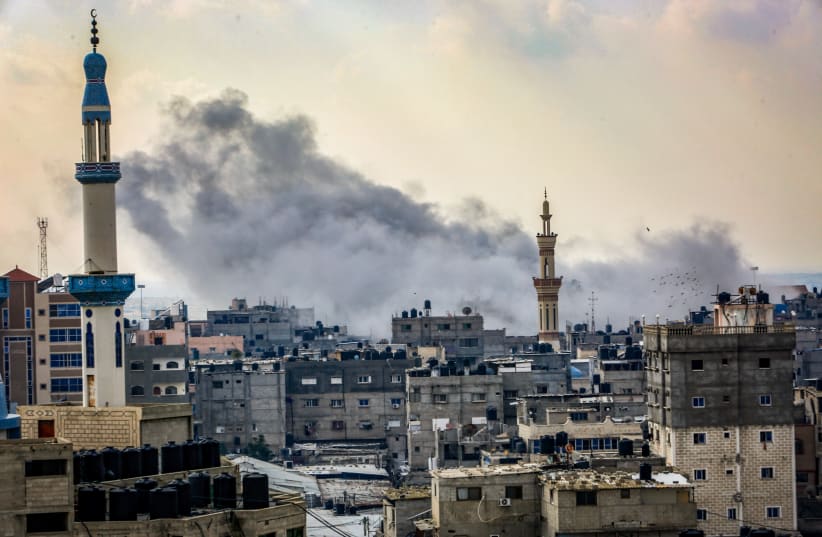
As the IDF deepens its activities in the southern Gaza Strip, the media concentrates on Khan Yunis. Given that the city, the adjacent refugee camp, and its tunnels are perceived as potential strongholds of Hamas leadership and the location where Israeli captives might be held, the focus on Khan Yunis is understandable. However, despite the complexity and the heavy human cost of the fighting in Khan Yunis, Rafah, in particular, appears to be a more complex trap, as the conflict there presents significant challenges in the bilateral, regional, and international arenas.
Since Israel completed its withdrawal from Sinai in 1982, Rafah has been divided between Egypt and the Gaza Strip. Even after the Oslo Accords were implemented, Israel continued to control the Rafah crossing and the strip that separates Palestinian territory from Egyptian territory – the "Philadelphi Corridor." This route quickly became a hub for terrorist activities against IDF forces and a conduit for smuggling weapons from Sinai through the tunnels.
Weapon smuggling increased after the disengagement in 2005, and with Hamas taking control of the Gaza Strip in 2007, it became even more rampant. Following "Operation Protective Edge" in 2014, Egypt began taking action against weapon smuggling by demolishing houses on the Egyptian side of Rafah and by flooding the tunnels along the Egyptian border.
If and when the IDF takes control of Rafah, it will have significant implications. In the bilateral arena, the occupation of Palestinian Rafah and the Philadelphi Corridor will not only increase the risk of unwanted shooting incidents between the IDF and the Egyptian army but will also violate the peace agreement between the two countries. According to the agreement, Israel is prohibited from deploying tanks and artillery east of the border in the narrow strip ("Area D"), allowing only the placement of four IDF battalions and no more than 180 armored personnel carriers.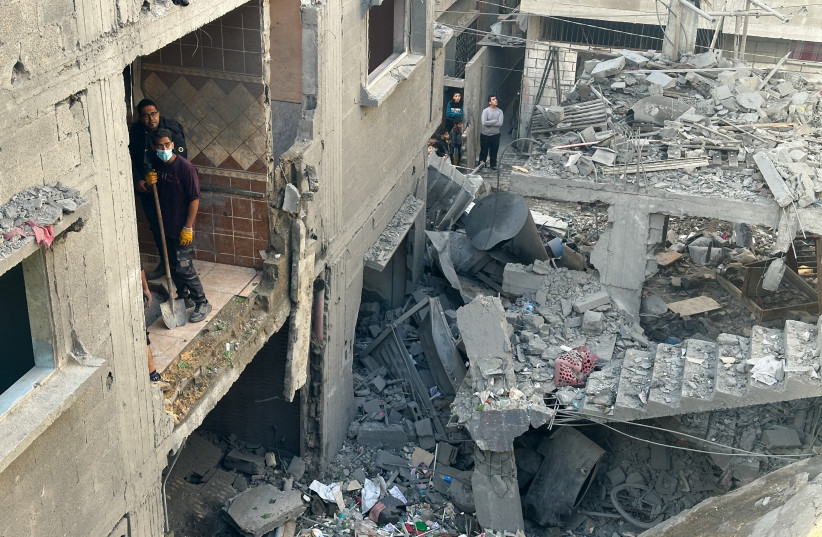
The temporary or permanent occupation of Rafah and the Philadelphi Corridor may lead Israel to violate this clause in the peace agreement, potentially sparking tensions with Egypt or prompting a demand for the reinforcement of Egyptian forces in Sinai. While changes to the agreement's clauses are possible, they require the consent of both parties. Additionally, the presence of Israeli forces in Rafah and along the Philadelphi Corridor may put Egypt in a dilemma. Egypt might soon be asked by Israel to act from the Egyptian side to block the channels of weapons transfer to the remaining terrorist elements in the Gaza Strip. Egyptian approval of such a request could be interpreted as an agreement to Israeli control of the strip.
Egypt's major concern, as evident from the early days of the conflict, is the influx of refugees from the Gaza Strip to Sinai. Egypt vehemently opposes this due to several reasons: besides being an economically struggling country with limited capacity to support the Palestinian refugee population, Egypt fears being perceived in the Arab world as aiding Israel in expelling or mistreating Palestinians. Furthermore, the presence of Palestinian terrorist activities in Sinai, along Israel's border, could lead to confrontations between Egypt and Israel if these elements act against Israel from Egyptian territory.
Internationally, control over the Palestinian side of the Rafah crossing holds significant implications. While Israel states that it has no intention of managing the civil affairs of the Gaza Strip and taking responsibility for the economy of its residents, international law dictates that Israeli control on the Palestinian side of the Rafah crossing would make Israel responsible, in the eyes of the world, for the livelihood and economy of the Gaza Strip population.
In any scenario, any Israeli move in Rafah and the Philadelphi Corridor will require Israel to negotiate and cooperate with Egypt on this matter, taking into serious consideration Egypt's positions and needs. In particular, Egypt is a preferred regional mediator for Israel not only in dealing with the issue of hostages but also in all matters related to communication channels with any Palestinian authority in the Gaza Strip. Failure to consider Egypt's needs might result in a catastrophe, leading to the restoration of the Muslim Brotherhood's control in Egypt and the return to power of Hamas' ideological patrons.
The question of "the day after" the war is closely linked to Rafah. So far, Israel has not provided the international community with an answer regarding the future of the Gaza Strip. The government has emphasized what it does not want ("Hamasstan" or "Fatahstan"), but it has not clarified what it does want. One assumption is that Israel prefers moderate Sunni Arab states – Egypt, Saudi Arabia, the United Arab Emirates, and Jordan – to manage the Gaza Strip, either in a civilian or military capacity.
Different factors in Egypt have already clarified that Egypt has no intention of controlling the Gaza Strip. However, even if Egypt agrees to participate in future arrangements, such as sending Egyptian workers to assist in the reconstruction of the Gaza Strip, Israel will need to take into account Egypt's position regarding Rafah and the Philadelphi Corridor.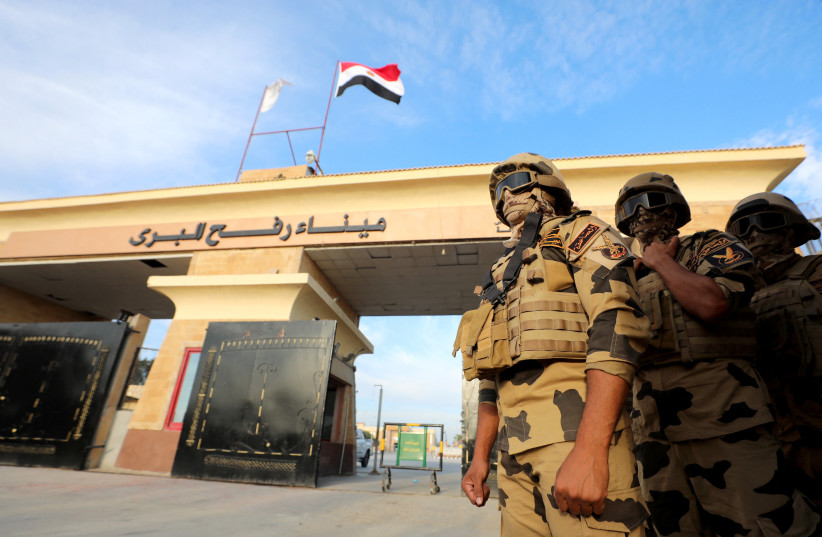
Implications on international level
On an international level, Israeli control over the Palestinian side of the Rafah crossing has significant implications. While Israel declares that it is not interested in governing the Gaza Strip and being responsible for the economy of its residents, international law stipulates that Israeli control of the Palestinian side of the Rafah crossing would make Israel globally responsible for the livelihood and economy of the Gaza Strip residents.
In any case, any Israeli move in Rafah and the Philadelphi Corridor will require Israel to negotiate and cooperate with Egypt on this matter, taking into serious consideration Egypt's positions and needs. In particular, Egypt is a preferred regional mediator for Israel not only in dealing with the issue of hostages but also in all matters related to communication channels with any Palestinian authority in the Gaza Strip. Failure to consider Egypt's needs might result in a catastrophe, leading to the restoration of the Muslim Brotherhood's control in Egypt and the return to power of Hamas' ideological patrons."
Dr. Nachum Shiloh is a Middle East expert at the Dayan Center at Tel Aviv University and CEO of the business intelligence company Global OSINT.
IDF finds traces of Hamas hostages in Gaza's Indonesian Hospital
According to the IDF, a yellow Toyota Corolla found in the internal hospital areas belonged to Samar Talalka, who was kidnapped by Hamas during the October 7 massacre.
The IDF announced Monday night that it found traces of two hostages on the grounds of the Indonesian Hospital near Jabalya in northern Gaza.
According to the IDF, a yellow Toyota Corolla found in an internal hospital area belonged to Samer Talalka, who was kidnapped by Hamas during the October 7 massacre. Talalka was one of three hostages mistakenly shot by IDF troops on December 15.
Additionally, blood traced to an unspecified hostage was found inside that vehicle along with pieces of a rocket-propelled grenade.
An Israeli vehicle taken on October 7 found in Gaza's Indonesian Hospital (IDF SPOKESPERSON'S UNIT)
The IDF announced as well on Monday that two more soldiers fell in battles in Gaza: Sgt. Rani Tamir, 20, and St.-Sgt.-Maj. (res.) Nitai Meisels, 30. Tamir, from Ganei Am, served in the 50th Battalion of the Nahal Brigade and was killed in a battle in northern Gaza. Meisels, from Rehovot, was a soldier in the Armored Corps and was killed in a battle in northern Gaza as well.
The IDF did not provide information about what intelligence it might have regarding Hamas’s handling of the second hostage, but said that these findings, along with another vehicle found on the hospital grounds that was used in the October 7 attacks, tied the hospital directly to Hamas and the massacre.
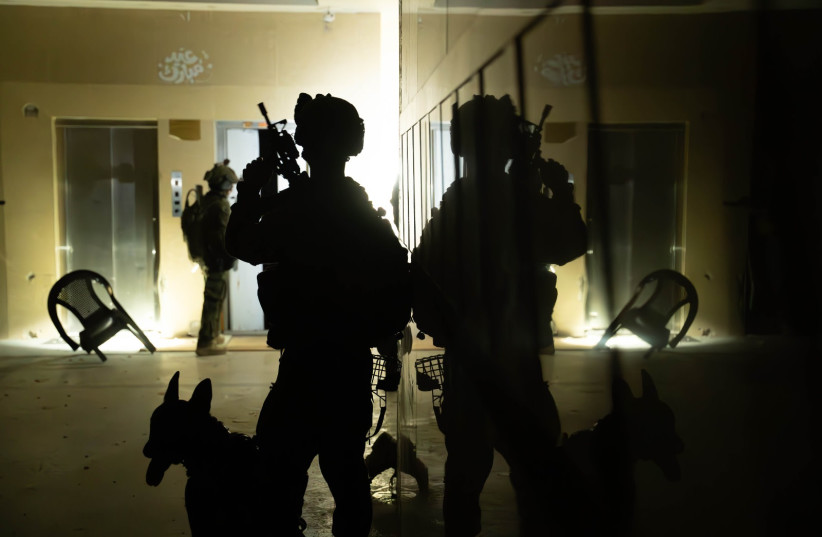
Previously, the IDF had disclosed videos showing two different hostages being taken into Shifa Hospital in Gaza City.
The military said that the Indonesian Hospital had been used by Hamas as a meeting and organization place for its terror and military activities. It added that armed Hamas forces had been observed there during the current war.
Tunnels in hospital vicinity
Like with Shifa, the IDF found tunnels in the close vicinity of the hospital, which allowed Hamas forces to come to and leave the hospital grounds without being tracked.
Further, the IDF added that the hospital’s dealings with Hamas limited its ability to handle more patients.
Unlike Shifa and Rantisi, where the IDF found large volumes of diverse weapons, the army did not state that there were weapons present or display any.
It was unclear when the IDF believed that Hamas forces fled the area, including cleaning out any weapons stores that might have been there.
Forces also found dozens of explosive devices hidden inside UNRWA bags during a raid of northern Gaza schools, where the IDF received intelligence of Hamas and Palestinian Islamic Jihad (PIJ) terrorists hiding.
Forces from the IDF’s Nahal Brigade raided the Al Rafaa and Zavaha schools in the areas of Daraj and Tuffah, where they also found a host of Kalashnikov rifles and 15 explosive belts ready for use.
During an exchange of fire with terrorists in the area, a cell fired an anti-tank missile at Israeli troops, the IDF said, before being eliminated with a precision strike missile.
The military released footage of the terror cell firing the missile before being gunned down by an IDF tank.
The IDF said that many terrorists affiliated with both Hamas and PIJ were located hiding inside the Gazan schools and later detained.
Some of them took part in the October 7 massacre of southern Israeli towns, the military added. They were taken into Israeli territory to be interrogated.
The combat team of the 4th Brigade has operated in recent weeks to clear areas of Khan Yunis and establish an operational hold on key junctions within the area. The soldiers have carried out precision raids, eliminating dozens of terrorists and destroying about 100 targets.
The forces also destroyed dozens of Hamas tunnels.
Amid the fighting, the soldiers, along with those from the Yahalom Unit, uncovered the lathe used to produce weapons and a concrete factory used to build tunnels, the IDF Spokesperson’s Unit said on Monday. After raiding the site, engineering forces destroyed the compound.
A stockpile of weapons found by the soldiers was also destroyed.
Separately, an IDF commander in Golani’s 51st Brigade was dismissed from his role after endangering Israeli forces fighting in Gaza City’s Shejaia neighborhood, N12 reported on Monday evening.
According to the report, the company commander was dismissed and replaced by another commander after ordering soldiers to enter homes in the area despite fears over the houses being booby-trapped, in an incident that occurred some three weeks ago.
There were no casualties in the incident, as per N12.
In addition, rocket attacks from Gaza on Israel remained in single-digit numbers on Monday, having also been in low numbers the day before.
There have been a few days of heavier rocket fire, but for the most part, the rocket fire from Gaza has dropped steeply since the IDF invaded southern Gaza nearly four weeks ago.
Go to the full article >>Israel expects response to killing of senior Iranian commander - report
Defense Minister Yoav Gallant said Israeli fighter jets are flying openly over Lebanon as Hezbollah is being hit "very hard" by the IDF.
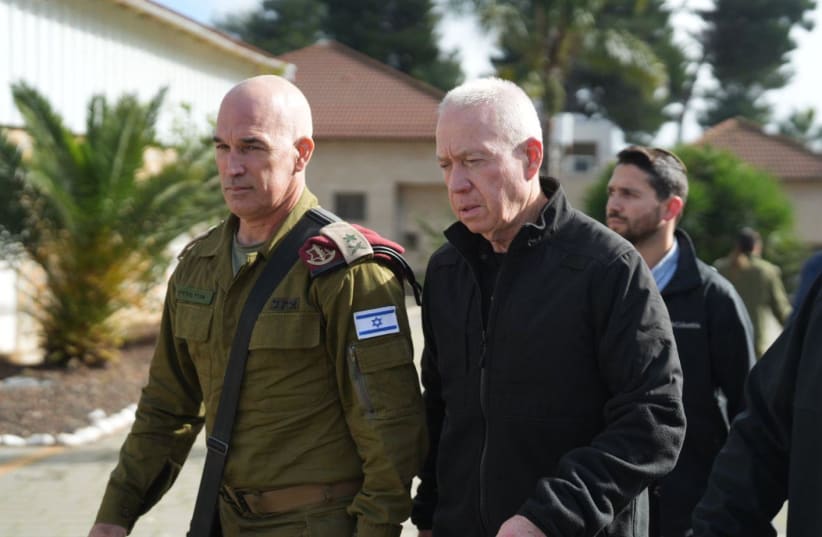
Israel is expecting a response on the northern front to the killing of Islamic Revolutionary Guard Corps (IRGC) commander Sayyed Reza Mousavi in Syria, Israeli media reported on Monday evening, citing defense establishment officials.
Earlier on Monday, it was reported that Mouasvi, a senior IRGC commander responsible for the military cooperation between Iran and its proxies in the region, was killed in an airstrike in the Damascus countryside.
According to Israeli security assessments, Iran had ramped up its transfer of weaponry to Shi'ite militias operating in Syria since the IDF launched its war on Hamas in Gaza.
Gallant: Israeli fighter jets flying openly over Lebanon
Defense Minister Yoav Gallant, who visited the IDF's Northern Command on Monday, said that Hezbollah was being pushed very far away from the border with Israel and that the IDF "will strengthen all of these efforts."
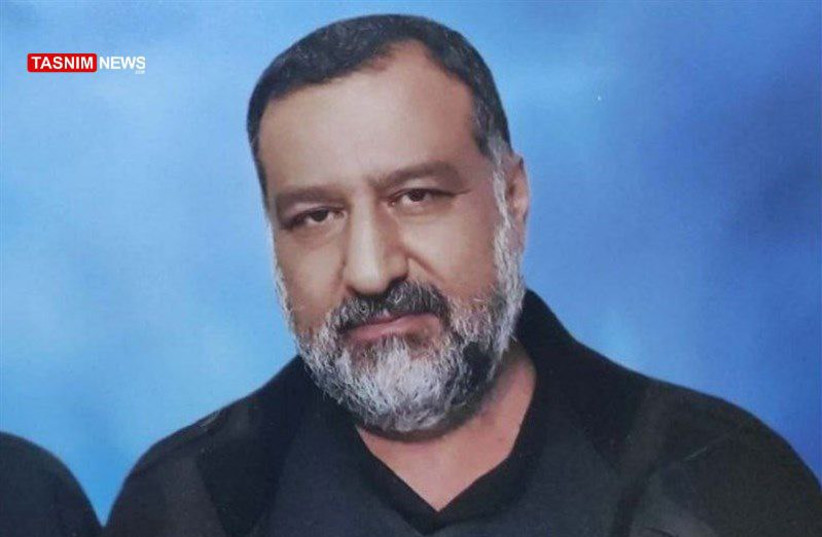
Gallant described how the IDF has killed over 150 terrorists in Lebanon, although Hezbollah only acknowledged around 125 of them as being directly connected to it, and not some other dozens connected to Palestinian terror groups.
The defense minister said that the IDF has also struck a significant amount of Hezbollah’s infrastructure near the border, forcing it backward as an operational matter, lest it otherwise be disconnected from weapons and supply lines.
In addition, he said that IDF aerial power has greater operational freedom within Lebanon than ever before.
He promised northern residents that the IDF would restore security either by a diplomatic deal or by a larger military operation, but still refrained from giving a timeline for deciding on the fateful issue.
Earlier Monday, Hezbollah fired rockets on Israel’s northern front, with the IDF responding with tank fire.
Over Sunday, the IDF engaged in heavier than usual attacks on Hezbollah and both sides have escalated attacks on each other in recent weeks, with Israel causing more damage to Hezbollah, given that around 80,000 northern residents evacuated the area months ago.
Go to the full article >>Israel-Hamas War: What you need to know
- Hamas launched a massive attack on October 7, with thousands of terrorists infiltrating from the Gaza border and taking some 240 hostages into Gaza
- Over 1,200 Israelis and foreign nationals were murdered, including over 350 in the Re'im music festival and hundreds of Israeli civilians across Gaza border communities